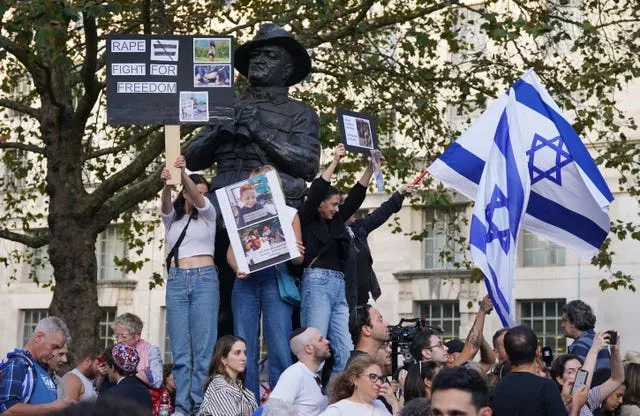By James Simons-
The streets of London bore witness to a multitude of voices and emotions as thousands of individuals took to the streets to protest and hold vigils in response to the ongoing conflict between Israel and Hamas.
The events unfolded against the backdrop of escalating violence in the Middle East, which has prompted passionate reactions from various groups in the UK capital.
Pro-Palestinian protesters converged outside the Israeli embassy in Kensington on Monday night, making their voices heard with chants of “Israel is a terrorist state” and “free Palestine.”
Illuminating the night sky with flares and fireworks, they underscored their fervent desire for a peaceful resolution to the conflict.
Videos shared on social media platforms showed the police working diligently to maintain a separation between pro-Israel and pro-Palestine groups near the High Street Kensington tube station.
The demonstrations were not without incident, as London police arrested three individuals involved in the protests, highlighting the charged atmosphere surrounding the issue.
Meanwhile, approximately 2,000 people gathered for a vigil in support of Israel in Westminster, organized by the Board of Deputies of British Jews and the Jewish Leadership Council.
This event coincided with Chancellor Rishi Sunak’s attendance at a prayer service at Finchley United Synagogue in north London.
Protesters in Westminster, while expressing solidarity with Israel, also displayed Palestine flags and placards with slogans such as “free Palestine” and “sanctions on Israel.” The diverse crowd in attendance reflected the complexity of the situation.
Home Secretary Suella Braverman has joined Metropolitan Police officers on a patrol in Golders Green – an area of north London with a significant Jewish population.
It came hours after a kosher restaurant in the area had its window smashed and cash register stolen, while “Free Palestine” was graffitied on a nearby railway bridge.
The graffiti is being investigated as a potential hate crime by the British Transport Police, with local authorities describing it as a “deliberate attempt to intimidate the Jewish community”.
The current escalation in the conflict began when Hamas launched a surprise assault on Israel, launching rocket salvoes across the border and attacking towns and army bases in southern Israel.
In response, Israel initiated airstrikes on Gaza and imposed a “complete siege” on the enclave, resulting in the cutoff of essential supplies such as water, food, and power. Tensions have further heightened with Hamas militants threatening to harm Israeli hostages if civilian areas continue to be targeted without warning.
The casualties from this conflict have been heartbreaking, with reports suggesting over 900 deaths in Israel and more than 650 in Gaza since the violence erupted.
Additionally, Hamas has taken over 100 hostages, according to Israel’s foreign ministry.
Groups including Stop the War and the Palestine Solidarity Campaign gathered in Kensington, demanding an end to the Israeli occupation.
The Palestine Solidarity Campaign emphasized the importance of understanding the cycle of violence within the context of Israel’s decades-long military occupation of Palestinian land, which has been deemed an “apartheid” system of oppression.
In Westminster, political leaders, including Security Minister Tom Tugendhat, Liberal Democrat Leader Ed Davey, and Shadow Foreign Secretary David Lammy, lent their voices to the pro-Israel vigil. Attendees waved Israeli flags and held banners proclaiming their solidarity with Israel.
Chief Rabbi Ephraim Mirvis, speaking at Finchley United Synagogue before the vigil, expressed deep sorrow and solidarity for those affected by the violence in Israel, emphasizing the “horrific” nature of terrorist acts.
He also lauded UK Prime Minister [Name] as a “great and wonderful friend” of Israel and the Jewish people.
Rishi Sunak, in condemning the “barbaric acts” committed by Hamas, echoed the prime minister’s stance, asserting unwavering support for Israel and emphasizing that there are “not two sides to these events.”
The protests and vigils in London serve as a powerful reflection of the deeply divided sentiments surrounding the Israel-Hamas conflict.
As the international community watches and world leaders weigh in on the situation, the voices of those in London stand as a testament to the urgency and complexity of finding a path towards peace and resolution in the Middle East.
The hope remains that dialogue and diplomacy will prevail over violence and that a lasting solution will emerge from this turbulent chapter.




